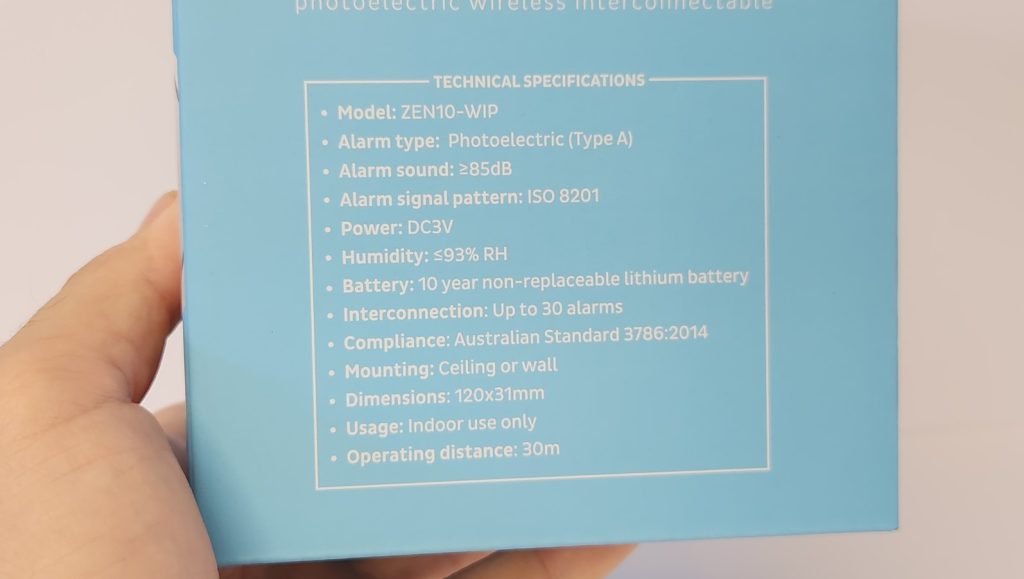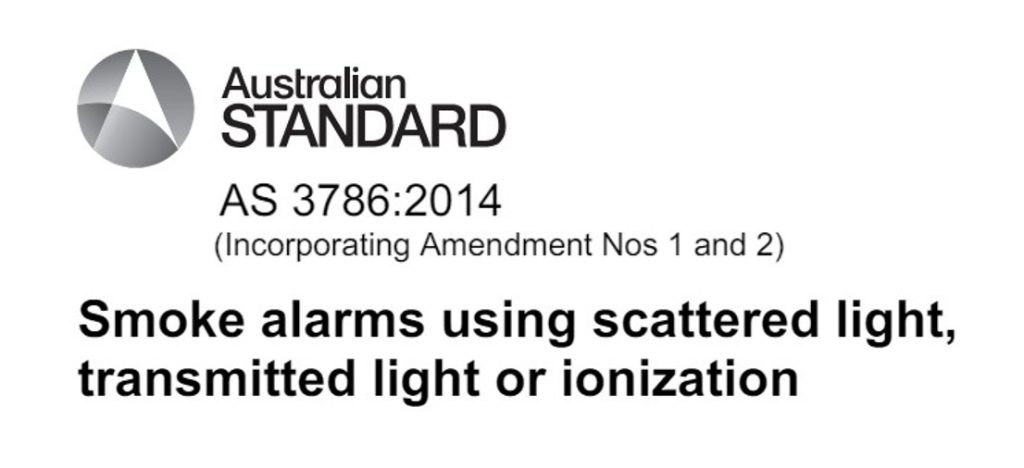Smoke Alarms And Australian Standard 3786:2014
All smoke alarms sold within Australia must comply to Australian Standard 3786:2014.
Section 4.22.1 of the Australian Standard describes the markings and types of information included on the smoke alarm itself. If the smoke alarm does not have all this information on it – then technically it is non-compliant to the standard.
Photoelectric Smoke Alarm Marking Requirements
Have a look at the photoelectric smoke alarm on your ceiling to double check if it has the following information.
4.22.1 Smoke alarm
Each smoke alarm shall be legibly and indelibly marked with the following:
(a) The number and date of this Standard (i.e. AS 3786:2014).
(b) The name or trademark and address of the manufacturer or supplier.
(c) The model designation (type or number).
(d) The type of smoke alarm (type A or type B), e.g. photoelectric or ionization.
(e) The alarm condition aural signal pattern (ISO 8201 or ISO 7731).
(f) The date of manufacture which may be coded into a serial number or the batch
number.
(g) The recommended date for replacement, subject to normal, regular maintenance
NOTE: Provision may be made for a place to note the date for replacement of the smoke
alarm.

ZEN photoelectric smoke alarm with all required markings as per Australian Standard 3786:2014
Smoke Alarms With 10 Year Battery
For a battery fire alarm incorporating a non-replaceable battery (i.e. 10 year lithium long life batteries sealed inside the unit), the following warning is also required:
WARNING: BATTERY NOT REPLACEABLE—SEE INSTRUCTION MANUAL.

ZEN photoelectric smoke alarm with 10 year battery – compliant with Australian Standard 3786:2014
Photoelectric Smoke Alarms – ‘DO NOT PAINT’ Marking
Additionally, a notice on the outer surface of the enclosure marked ‘DO NOT PAINT’ is required. The letters shall be not less than 3 mm high and plainly visible after the smoke alarm is installed in its intended manner. Be wary of many cheap ‘knock off’ smoke alarms sold in online marketplaces – they do not have all this required information even though they profess to comply to the Australian Standard. Whilst it may seem trivial whether the smoke alarm has this information on it or not, in the event of a house fire and subsequent insurance claim, your insurer could be double checking this same information prior to making any potential pay-out.

ZEN smoke alarm with required ‘DO NOT PAINT’ marking
Photoelectric Smoke Alarm Packaging – Essential Info
Section 4.22.2 of the Australian Standard identifies the information and data which must be incorporated into the smoke alarm’s point of sale packaging (i.e. the box it comes in) and also within the user manual. As before, if the information below is not included then technically the smoke alarm is non-compliant to the standard.
4.22.2 Packaging
The point-of-sale packaging shall be marked with the following:
(a) The model designation (type or number).
(b) The type of smoke alarm (type A or type B) and an explanation of the meaning of the type designation (e.g. photoelectric or ionization).
(c) The nominal sound level output.
(d) The alarm condition aural signal pattern (ISO 8201 or ISO 7731).
(e) For smoke alarms using 520 Hz alarm condition signal frequency, the nominal frequency.
(f) For type B smoke alarms, permanently marked with the trefoil symbol, and name of
radionuclide and activity. The markings shall be visible from the outside of the packaging.
(g) The maximum number of interconnectable smoke alarms.
(h) Statement if the smoke alarm is suitable for wall (vertical) mounting.

ZEN photoelectric smoke alarm packaging is compliant with Australian Standard 3786:2014
Summary
In summary, section 4.22 of the Australian Standard describes the necessary information which must be included on the alarm, packaging and in the instruction manual. It is a requirement which manufacturers and retailers must adhere to.

QLD legislation states that smoke alarms must be photoelectric. They must also be interconnected smoke alarms and conform to Australian Standard 3786:2014. Failure to do so could have implications in the event of any insurance pay-out following a house fire.

Want to know more? Watch our ZEN quick start video or call us on 0478 596 402 today.
We love talking smoke alarms!
ZEN Photoelectric Smoke Alarms
New Farm, QLD, 4005

